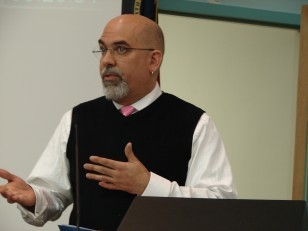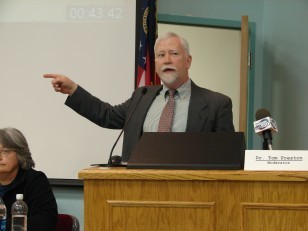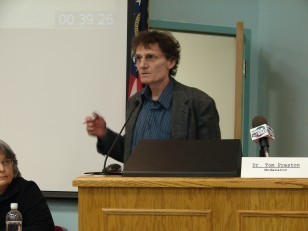Students and panelists who opposed the removal of Stanley Bermudez' Confederate flag depiction said it amounted to censorship.
Bermudez an adjunct professor at GSC, said he knew his work, entitled 'Heritage', would draw pro and con reaction, but did not expect it would be removed from the Roy C. Moore Art Gallery.
"We would not be here discussing censorship if I would have painted 'Dogs Playing Poker'," Bermudez said. "I believe I was censored and my academic freedom was violated."
Student panelist Barry Colbough spoke up for College President Martha Nesbitt, who was not there. He said she made the right decision last month to protect the college and students; the flag shows a lynching and the Ku Klux Klan.
Dr. Nesbitt said in a statement that the decision was 'not based on any one group's agenda, complaint or the overall content of the painting but on the depiction of lynching that has been perceived as aggressively hostile in other areas of the country and other academic institutions'.
Sons of Confederate veterans panelist Charles Lunsford said the painting mis-represented southern heritage, was offensive to him as a member of the S.C.V. and should have been removed.
Associate Political Science Professor Sean Herlihy said the S.C.V. was closely aligned with the Ku Klux Klan and Neo-Confederate groups targeted GSC to get rid of the painting.
"This is the fifth museum that Neo-Confederates have targeted in the South," Herlihy said. "This is a campaign to target museums and we are vulnerable because we try to get along with the community and we often concede to these kind of things."
In his reply, Lunsford said there is a campaign, going on for a long time, and his organization was created because continuing attacks on Old South heritage.
"We have gone through a systematic attack on everything related to the Old South in our own region for about 30 years now," Lunsford said. "I pointed out to Martin Luther King the Third that his father never, during the Civil Rights period, said anything bad about Confederate heritage or Southern History. It started after that with a specific campaign to eradicate everything related to the Old South and we are resisting it."
Gainesville State College journalism professor Merrill Morris recalled when the song 'Dixie' was banned when she attended the University of Georgia. Morris also opposed removing the painting, calling it censorship.
"I remember the fact that they had to hire state patrolmen to protect our band director from being assaulted after the games because we had so many people screaming to hear 'Dixie'," Morris said. She also remembered growing up in the segregation south, when there were separate drinking fountains for blacks and whites.
Student panelist Denzil Gelly also argued against the painting's removal, pointing out that as a native of Jamaica the painting controversy inspired a perspective.
"There is the concept of the South having the privilege of exonerating itself, and how it sees itself, but remember there were black people mistreated in the South and they too have the right to exonerate themselves and express how they saw the South," Gelly said.
Professor Joan Marler, who is an attorney and Director of GSC's paralegal program and Dr. Nesbitt's legal advisor, said the panel discussion was well done but was weighted towards one side; the side that said the painting was censored.
"To me, when you have young students, it's to be expected that young people are pretty much of a liberal bent, I think, but as you grow older your opinion might change," Professor Marler said. "It was obviously weighted towards the fact that censorship had occurred."
As for the censorship question as it relates to the First Amendment, Marler said there are restrictions.
"There are a lot of restrictions placed on the First Amendment," she said. "You can't say fighting words or defamation words, or profanity or pornography, there have been lots of Supreme Court decisions on restrictions on what the students think free speech is. You cannot say anything you want at any time at any place in any manner. You can't say things that lead to violence and where people get hurt. That's been decided by our court system."
Marler said one example from the Supreme Court was the opinion that 'you can't yell fire in a crowded theater'.
Marler said the Confederate Flag that originally was designed to fly over southern troops in battle 150 years ago, is still getting attention.
"I'm not sure that's something we wanted," she said. "It certainly is getting both sides riled up again."

No vacant seats in the Continuing Education auditorium for painting discussion

Bermudez an adjunct professor, at GSC, said he knew his work, entitled

Sons of Confederate veterans panelist Charles Lunsford said the painting mis-represented southern heritage

Associate Political Science Professor Sean Herlihy said Neo-Confederate groups targeted GSC to get rid of the painting
http://accesswdun.com/article/2011/2/236234
